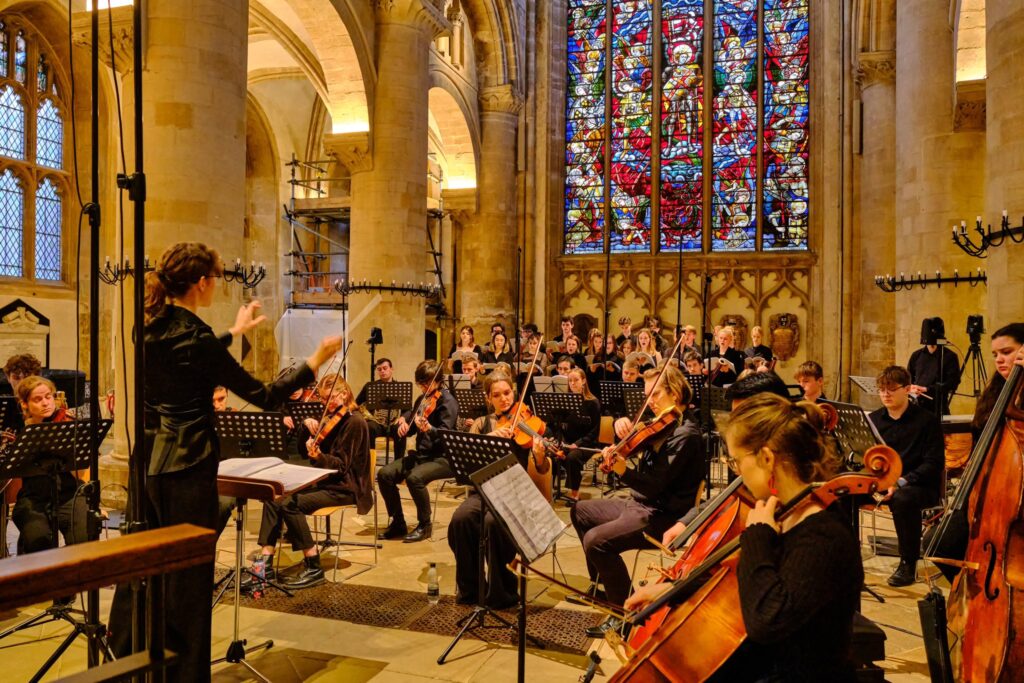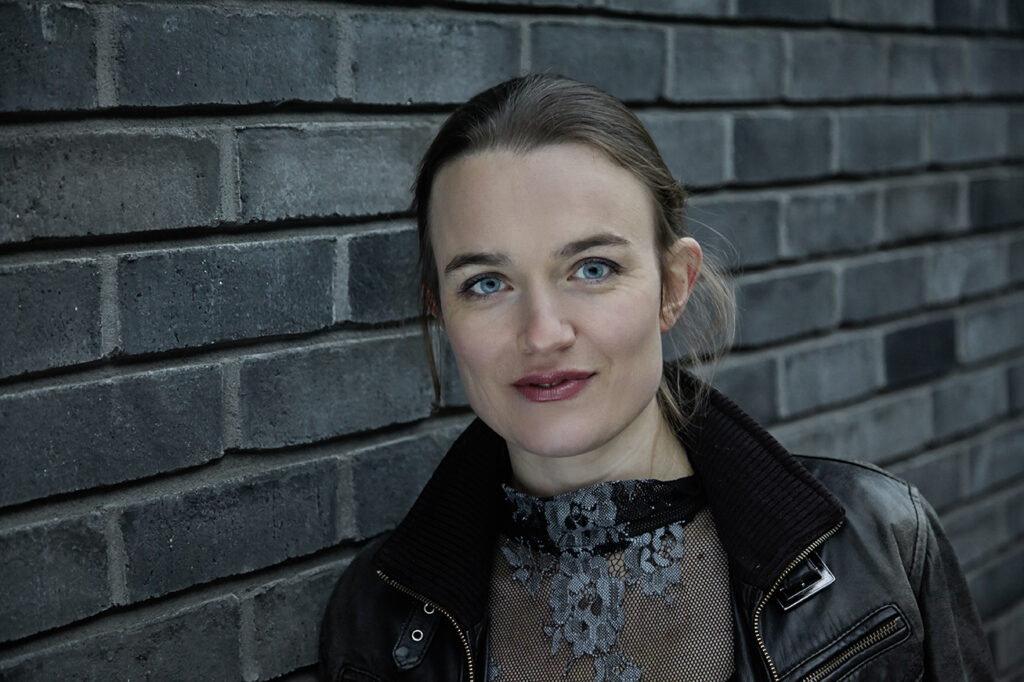It was in a lecture hall at the University of Oxford that student Angie Wyatt was inspired to give voice to a piece of music that has gone unheard for over 100 years, buried in the depths of the British Library.
The piece was suffragette Ethel Smyth’s The Song of Love, world premiered by The Alternative Canon Project in May 2023. The initiative, begun by Oxford students, aims to diversify the classical music canon. As well as campaigning for change, they put on concerts and events to redress the balance of concert programmes in Oxford and beyond.
Leah Broad, author of newly released book Quartet: How Four Women Changed the Musical World, was teaching a lecture on Smyth, to which Wyatt listened, enraptured. “She was going through the list of works,” says Wyatt. “At one point she said, ‘The Song of Love, cantata, never published or performed.’ I thought, ‘that’s interesting, I wonder why not?’”
Wyatt approached Broad to ask her why this work had gone unperformed. She answered that it was just a lot of work. “Because I’m crazy, I thought, this would be fun. I decided to make the first edition and make it happen,” says Wyatt.

As all unpublished musical works in the UK are in copyright until 2039, Wyatt had to contact the copyright holder in order to draft up a license and pay royalties. She says this poses a massive barrier to the performance of women’s compositions. “Because of vast structural prejudices, it was harder for women in a lot of cases to get their work published,” says Wyatt. “Now, after they’ve died, even if their published body of work is out of copyright, everything else is in copyright.”
Wyatt went along to the British Library to take photographs of Smyth’s manuscript and began the long process of transcribing 45 minutes of score for orchestra, choir and soloists. This was not a straightforward process: “There’s a lot of ambiguous bits of handwriting where you’re trying to make decisions about what it should be.”
Once the scores had been produced, she then undertook the task of organising the world premiere performance. “It’s quite a challenge to organise a performance of that scale,” says Wyatt, who also sang in the performance. She says she is lucky to be surrounded by people at Oxford who are interested in the project and willing to be a part of it.

After months of work, Smyth’s The Song of Love finally came to life in a performance at Oxford’s Christ Church Cathedral on 8 May 2023. “There was such a sense of ‘Wow, we’re hearing something that’s never been heard before’,” says Wyatt. “I wasn’t expecting such a magical atmosphere.” She has since received interest from publishers and orchestras. “There’s exciting things in store for the future of it,” she says.
Of the 20,400 compositions scheduled for the 2021-22 season across the world, 87.7% were written by white men, with just 7.7% composed by women, according to Donne, Women in Music.
For the 97 Ensemble, set up by cellist Niki Moosavi, performing works by women composers has been an ongoing aim. The ensemble is named after the 2021 UN report that 97% of women aged 18 to 24 have experienced sexual harassment. They regularly perform to women at charity Solace Women’s Aid’s refuges. “If we’re going into a refuge playing to women, I want them to hear music by women,” she says.
I’ve had some comments that it’s difficult to perform works that have been left out in history, because it’s easier to understand the intentions if you have a bit of context. I want people to stop using that excuse and learn the context
Niki Moosavi, 97 Ensemble
Moosavi says there is something unique about performing works by underrepresented composers. “I think everyone has their favourite piece of music and if you think of the first time you heard that piece, it’s so exciting,” she says. “Playing works by underrepresented composers, you’re showing some people a piece of music for the first time, and that’s such a lovely feeling to grasp onto.”
It is not just the music itself, but the stories behind these composers which draws her to perform their work, Moosavi says. “I think it motivates you to play their music,” she adds. “You can really hear Ethel Smyth’s frustration in a lot of her music and I think it does help with interpretation.”

The 97 Ensemble recently performed Louise Farrenc’s Nonet. Farrenc was the only female Professor of Piano at the Paris Conservatoire for the whole of the 19th century. Following Nonet’s publication, she received equal pay. “I like to pick pieces that have a story behind them,” she says. “I’ve had some comments that it’s difficult to perform works by these composers that have been left out in history, because we don’t know them and it’s easier to understand the composer’s intentions if you have a bit of context. I want people to stop using that excuse and learn the context.”
The lives of women composers have increasingly been receiving attention in the past few years. Not only does this raise their profile but it makes researching their intentions a lot more accessible. Kyra Steckeweh has been part of this change, producing two documentaries: Women Composers, which explores the lives of Lili Boulanger, Mel Bonis, Emilie Mayer and Fanny Mendelssohn-Hensel, and Dora Pejačević, which focuses entirely on the Croatian composer.
Steckeweh, who is also a professional pianist, says that the idea for the documentary emerged from searching for music by women composers to add to her repertoire. She asked the filmmaker Tim van Beveren to help her with creating short videos about the composers to share alongside the music. “I told him the background stories of the women composers I was performing,” she says. “He immediately said that’s suitable for a bigger documentary, not only five minutes, but to make it a real issue, an investigation.”
Listen: Spotify playlist of forgotten female composers
The films were a success and Women Composers won the prestigious Opus Classic award in Germany. Despite her research into these composers, Steckeweh still finds it hard to answer why they have been so underperformed. “I think [male composers] had people who published their works after their death and women composers didn’t have that,” she says. Although, she says there are exceptions. “After Lili Boulanger’s death, Nadia Boulanger performed the works of her sister, she published them, made them known. That is why she is quite known until this day, and others are not.”
While a well-known figure in Croatia due to her aristocratic status, Dora Pejačević’s music is still underperformed. her works were left to her husband after her death and he didn’t publish them, bequeathing them to an archive just before he died, where the music was closed away for decades. This year, to celebrate the centenary of Pejačević’s death, Steckeweh is releasing new recordings of her compositions each month, along with artwork inspired by the music. “It’s music that goes to the heart of people right away,” she says.
I think we underestimate our audiences. I don’t see why we can’t give something new on a plate and leave it up to them to decide if they like it or not
Niki Moosavi, 97 Ensemble
Steps are being taken to bring women composers to the foreground: while at the Royal College of Music, Moosavi was part of a successful campaign for syllabuses to be amended. At the conservatoire, it is now a requirement for undergraduate students to perform a piece by an underrepresented composer. The Alternative Canon Project at Oxford is also planning to formulate a pledge to send to the Oxford University Music Society ensembles, for them to perform a certain amount of works by women or underrepresented composers.
Moosavi says that while things are changing, there are still barriers to work by women composers being performed. “I think just as humans, we like what we know, so I understand why people are more willing to go to a concert where they know something on the programme.” She says it is also easier for musicians to perform works they are familiar with. “It’s safe, you can be certain it’s going to go well. It’s a risk to do something new.”
However, Moosavi believes this is a risk worth taking. “I think we underestimate our audiences. I don’t see why we can’t give something new on a plate and leave it up to them to decide if they like it or not,” she says.
Wyatt believes that making the canon more inclusive is vital for the future of classical music composition. “Changing the story we tell about women in music history and showing that, alongside Beethoven and Bach, there were also women composers, could completely change people’s aspirations towards composing.”
Read: ‘I passionately care about both aspects of my life’
Read: ‘Diversity drives excellence’: the fight for fair music education
Read more from our unheard voices here

